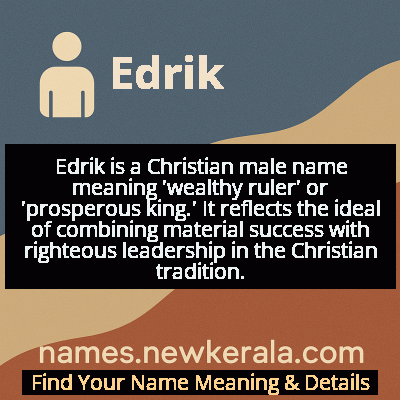Edrik Name Meaning & Details
Origin, Popularity, Numerology Analysis & Name Meaning of Edrik
Discover the origin, meaning, and cultural significance of the name EDRIK. Delve into its historical roots and explore the lasting impact it has had on communities and traditions.
Name
Edrik
Gender
Male
Origin
Christian
Lucky Number
2
Meaning of the Name - Edrik
Edrik is a Christian male name meaning 'wealthy ruler' or 'prosperous king.' It reflects the ideal of combining material success with righteous leadership in the Christian tradition.
Edrik - Complete Numerology Analysis
Your Numerology Number
Based on Pythagorean Numerology System
Ruling Planet
Moon
Positive Nature
Diplomatic, friendly, artistic, empathetic.
Negative Traits
Over-sensitive, moody, indecisive, prone to self-pity.
Lucky Colours
Green, cream, white.
Lucky Days
Monday.
Lucky Stones
Pearl, moonstone.
Harmony Numbers
1, 3, 4.
Best Suited Professions
Diplomats, mediators, caregivers, artists.
What People Like About You
Cooperative spirit, friendliness, artistic talent.
Famous People Named Edrik
Edrik of Kent
Anglo-Saxon noble
Early Christian convert who helped establish monastic traditions in England
Edrik Streona
Anglo-Saxon noble
Ealdorman of Mercia known for his political influence during the reign of Æthelred the Unready
Edrik the Merchant
Medieval trader
Wealthy merchant who funded the construction of St. Edrik's Chapel in York
Edrik van der Heijden
Religious scholar
Dutch theologian who contributed to early Protestant biblical translations
Name Variations & International Equivalents
Click on blue names to explore their detailed meanings. Gray names with will be available soon.
Cultural & Historical Significance
The name gained Christian significance through several saints and religious figures, most notably in the cult of St. Edrik of Kent, an early Anglo-Saxon convert who established one of the first monastic schools in England. During the Norman Conquest, the name became associated with English resistance and cultural identity, though it later evolved to represent the ideal Christian merchant—wealthy but charitable, powerful but pious. This dual nature made Edrik a popular choice among families seeking to express both worldly success and spiritual devotion.
Extended Personality Analysis
Individuals named Edrik are often perceived as natural leaders with a strong sense of responsibility and practical wisdom. They tend to exhibit a balanced combination of ambition and integrity, showing both the drive to achieve material success and the moral compass to use their resources wisely. This creates personalities that are both commanding and compassionate, able to make tough decisions while maintaining ethical standards. Their leadership style is typically characterized by strategic thinking and a talent for organization, making them effective in positions of authority.
Socially, Edriks are often described as reliable and stable, with a grounded approach to life that inspires confidence in others. They possess a natural dignity and poise that can be mistaken for aloofness, but those who know them well appreciate their dry wit and steadfast loyalty. Their combination of traditional values and modern adaptability allows them to navigate complex social situations with grace. While they may appear reserved initially, they form deep, lasting relationships built on mutual respect and trust.
Modern Usage & Popularity
In contemporary times, Edrik has experienced a modest revival as parents seek distinctive yet traditional names with strong historical roots. While not among the most popular names, it maintains a steady presence in English-speaking countries, particularly among families with Anglo-Saxon or Germanic heritage. The name appeals to modern parents who appreciate its combination of classic sound and meaningful etymology, offering an alternative to more common names like Eric or Edward. Current usage trends show it appearing more frequently in educated, middle-class families who value both cultural heritage and individual distinction in naming choices.
Symbolic & Spiritual Meanings
Symbolically, Edrik represents the harmonious balance between material prosperity and ethical leadership. The name embodies the concept of 'noblesse oblige'—the idea that those with wealth and power have a responsibility to serve others. It symbolizes the integration of worldly success with spiritual values, suggesting that true leadership involves both practical wisdom and moral integrity. The name carries connotations of stability, reliability, and traditional strength, while also representing the potential for growth and adaptation within established frameworks.

